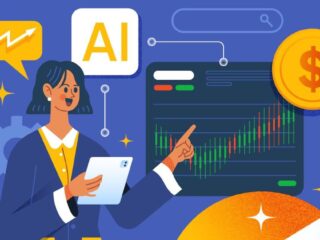
Artificial intelligence (AI) is dramatically altering Canada’s job market, reshaping not only the types of jobs available but also how work is conducted across numerous sectors. As AI technology advances, some jobs are at risk of disappearing, but a host of new roles are emerging that require Canadians to be adept with AI-related skills like data analysis and informed decision-making.
If you’re a Canadian worker, it’s natural to feel concerned about how these shifts will affect your career. While some jobs may vanish, many others are evolving, presenting fresh opportunities to collaborate with AI systems and take on tasks that leverage both human and machine strengths.
How AI is Automating Routine Tasks and Boosting Productivity
One of the biggest ways AI is changing the workplace is by taking over repetitive and mundane tasks. AI systems can efficiently manage tasks that don’t require complex human insights, enabling employees to focus on more sophisticated, creative, and meaningful work. This shift boosts productivity, giving workers the chance to engage in roles that offer more fulfillment and make a greater impact on their organization.
Across industries, AI is streamlining business operations. For example, in customer service, AI-powered chatbots now handle straightforward inquiries, allowing customer service representatives to focus on cases that need empathy and nuanced problem-solving. This is only one example of AI’s reach, which spans coding, marketing, legal work, and even healthcare management, illustrating how these technologies are reshaping the modern workplace in Canada.
Industries Being Transformed by Artificial Intelligence
AI’s impact is significant across a wide range of Canadian industries, each adapting to AI-driven tools in distinct ways. In some cases, AI introduces efficiencies that can reduce demand for certain job roles. In others, new opportunities are arising, creating a dynamic landscape for the Canadian workforce.

In manufacturing and production, for instance, AI automates assembly line tasks, enhances quality control, and improves accuracy. These changes mean that some traditional roles, like assembly line workers and quality assurance inspectors, may see less demand as robots and AI-driven systems take on these routine tasks.
The transportation and logistics sector is also changing, particularly with the development of autonomous vehicles. This technology could eventually affect jobs like truck driving and taxi services. Warehouses are also being automated, reducing the need for human labor in sorting and managing goods.
Administrative and office roles face similar challenges. Positions like data entry clerks, receptionists, and basic bookkeeping staff may see decreased demand as AI software can now manage schedules, generate reports, and maintain records more efficiently than before.
AI is especially transforming the gambling industry, making a noticeable impact on online casino sites. Through AI algorithms, online casinos are now able to offer more personalized experiences, tailoring game recommendations based on players’ preferences and play history. Additionally, AI is enhancing security measures; algorithms analyze player activity to detect unusual patterns and prevent fraudulent behavior, ensuring a safer experience for Canadians on these platforms. Canadian casino sites have also incorporated AI in customer support systems, allowing players to receive quick assistance through automated responses, which boosts operational efficiency and creates a more seamless gaming environment for users.
In agriculture, AI tools are increasingly handling tasks like planting and harvesting, which reduces the need for manual farm labor. Similarly, the banking and finance sector is witnessing a shift, as AI-powered programs can analyze data patterns to assess creditworthiness and forecast financial risks. Entry-level roles, such as junior financial analysts and loan officers, may become less common as a result.
Adapting to Job Changes Caused by AI
Adapting to these shifts involves not only keeping pace with technological advancements but also investing in your own development. In an AI-driven job market, it’s essential for Canadians to remain flexible, ready to learn, and willing to explore different skills that align with new industry demands.

The concept of lifelong learning is critical in this environment. Canadians who are open to acquiring new skills and adapting to change will be better equipped to succeed in the AI-driven future. Whether through formal courses, industry certifications, or self-guided studies, expanding your knowledge of how AI affects your field can make you more resilient in the face of change.
In addition, soft skills such as empathy, creativity, and leadership are likely to remain highly valuable. While AI can handle data and logic-based tasks, it still lacks the depth of human emotions and interpersonal skills. Building your emotional intelligence, communication abilities, and problem-solving skills can set you apart in areas where human touch and nuanced understanding are essential.
A basic understanding of digital tools, including AI applications, can also be beneficial. You don’t need to become a tech expert, but familiarizing yourself with AI systems and digital platforms can keep you competitive in an AI-integrated job market. Specialized training in areas such as data analysis, machine learning, or even AI ethics could further bolster your resume and open doors to new roles created by AI developments.
Diversifying your skill set is another effective approach. By developing expertise across various areas, you become more adaptable and able to pivot if your current role is impacted by AI. Building a diverse range of skills can give you the flexibility to transition into other fields or roles with relative ease.



